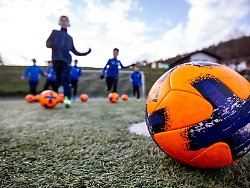Friday 23 April 2021
Associations disappointed
“Emergency brake” restricts children’s sport again
In most German regions, it will initially be a little quieter on the sports fields. The “Federal Emergency Brake” also brings new restrictions for children and mass sports. What is true now? And what if the situation improves again?
The “Federal Emergency Brake” comes into force – and also brings changes for popular and children’s sport with it. In contrast to before, the law uniformly regulates how to deal with outdoor exercise in regions with higher incidences. So far, different rules have applied in the federal states, and in some cases children’s sports in particular have been the subject of far-reaching exceptions. An overview:
What is on the subject in the “Federal Emergency Brake”?
Above an incidence of 100, districts and cities have to severely restrict the supply. For children under 14 years of age, contactless training may take place in a group size of no more than five. Otherwise, also for adults, only individual sport is allowed: a maximum of two or with people from your own household.
And what applies below the 100 limit?
If the incidence is below 100, the rules that previously applied in the respective federal state apply. These are based on the federal-state resolutions from the beginning of March, when openings were set in several stages. Since the intended target incidences of 50 were practically nowhere achieved, the first opening step was usually the last one to apply. This provides for children’s sports (up to 14 years) with a maximum of 20 people. In addition, individual sports may be practiced outside.
But wasn’t there an “emergency brake” for incidences above 100?
Yes, the federal-state resolutions provided that rules should be tightened if incidences in regions rise above 100. This was implemented in the federal states, sometimes more, sometimes less courageously. In some cases, the federal states have defined exceptions for children’s sports in particular. In North Rhine-Westphalia, for example, it was still possible to train in larger groups even with higher incidences.
How are the sports associations reacting to the tightening?
President Fritz Keller speaks for the German Football Association. He is dissatisfied: “Anyone who plays football outside does not endanger his health, on the contrary: he strengthens it.” He calls for political decisions to be based on facts: “More and more scientific studies by aerosol researchers and epidemiologists prove the extremely minimal risk of infection in the fresh air and the growing health risks due to lack of exercise.”
The President of the German Olympic Sports Confederation, Alfons Hörmann, is also disappointed. After a year of “prescribed immobility, every new form of restriction really hurts. Our 90,000 clubs have been hoping for more normalcy in vain for months. The restrictions put a strain on the body, soul and spirit of children as well as of senior citizens and all age groups in adults. Area, “said Hörmann.
.
